
|
On behalf of Taiwan in the Indo-Pacific Region and its National Security Task Force the Hoover Institution invites you to Narratives of Civic Duty and Taiwan’s Democratic Trajectory on Thursday, January 26, 2023 from 12:30 - 1:45 pm PT. To attend, register at the event page. In her newly-published book Narratives of Civic Duty: How National Stories Shape Democracy in Asia, Aram Hur investigates the impulse behind a sense of civic duty in democracies. Why do some citizens feel a responsibility to vote, pay taxes, or take up arms for one's country? Civic duty is typically seen as the result of culture or character. Rather, Hur finds that it emerges from a force long seen as detrimental to democracy: strong national attachments. National stories—the folklore of the national people—embed relational legacies with the state that can harness, stunt, or even subvert the nation’s powerful pull toward civic duty. The talk focuses on the case of Taiwan and how its diverse national stories have shaped its democratic past and future.  Aram Hur is Assistant Professor of Political Science and Co-Director of the Institute for Korean Studies at the University of Missouri. Her research focuses on nationalism and democracy in East Asia, with special attention to issues of identity change, integration, and democratic support in the Korean peninsula and Taiwan. She is the 2021 Korea Society Sherman Emerging Scholar and a 2018-19 CSIS U.S.-Korea NextGen Scholar. She is the author of Narratives of Civic Duty: How National Stories Shape Democracy in Asia(Cornell University Press, 2022). She holds a PhD in Politics from Princeton University, MPP from the Harvard Kennedy School, and BA with honors from Stanford University.
0 Comments
In my latest piece for Taiwan Insight, I consider the lack of absentee or early voting options for people stuck in quarantine or who were COVID-positive during the 2022 Taiwan local elections. I'm pretty critical of Taiwan's leadership here: they had more than two years to think about this problem, but they didn't learn from the rest of the world and were woefully underprepared to hold an election during a pandemic. 65k people were denied the right to vote as a result. That is indefensible. It is long past time for Taiwan to introduce alternative ways to vote for citizens who can't physically access their polling stations. Korea and Japan share similar electoral administrative features, but they are way ahead of Taiwan now. "With its colourful and fiercely contested campaigns, efficient electoral administration, and universal acceptance of the results, Taiwan’s recent local elections were, in most ways, a sign of a vibrant and healthy democracy. But one aspect failed to live up to basic democratic standards: thousands of people were denied the right to vote because they were trapped in mandatory COVID quarantine. After nearly three years of dealing with a global pandemic, Taiwan’s leaders should have been able to find some way to accommodate these citizens, as many other countries around the world have managed to do under much more difficult circumstances. Instead, they ignored the issue, and many Taiwanese were denied the right to vote. Taiwan’s democracy has received much recognition recently for its impressive vitality and resilience. But on voting rights, it is now a laggard. It can and must do better."
The rest of this piece appears at Taiwan Insight. 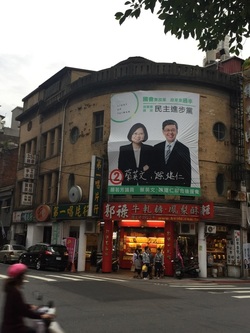 Campaign poster of Tsai Ing-wen and her running mate, Chen Chien-jen, in Datong District in Taipei, January 2016. Campaign poster of Tsai Ing-wen and her running mate, Chen Chien-jen, in Datong District in Taipei, January 2016. I've been going through some of the 2016 Taiwan elections data for another project, and I came across something that I haven't seen noted elsewhere. In the presidential vote, Tsai Ing-wen actually improved her vote shares more in the north than elsewhere in Taiwan. Nationally, she won 45.63% of the total vote in 2012, and 56.12% in 2016, for a net aggregate swing of 10.49%. But this increase wasn't uniform across Taiwan. Her worst performance relative to 2012 was in Penghu, where her vote share increased from 45.65% to 50.81%, for a net swing of only 5.16%. Her best was in Taipei, where she increased her vote share from 39.54% to 51.96%, for a net swing of 12.41%, which gave her an absolute majority of the vote. Again, that was in Taipei, which was supposed to be the bluest stronghold of them all, and the most resistant to the appeal of the DPP ticket! (Or at least that's what this idiot thought.) Moreover, Taipei wasn't an outlier. From Keelung all the way through Miaoli, Tsai's vote share increased more in every single northern jurisdiction than it did nationally, as the table below shows. By contrast, the swing toward Tsai was lowest in the south and east/island jurisdictions. And central Taiwan, where I thought the swing would be largest, was actually slightly behind the national average. (Perhaps that's one of the reasons several endangered KMT incumbent legislators in Taichung and Nantou held on to win re-election. More on that in another post.)
This result is surprising in part because it's the opposite of what happened in 2012, when the national swing toward Tsai was 4.24%. In that election, Tsai's gain was lowest in Taipei at 2.58%, and highest in Pingtung at 4.88%. In other words, in 2016 Tsai improved the most in precisely the places where she improved the least in 2012. Nowhere is this more apparent than in Taipei itself: a DPP majority there was hard to imagine as recently as two years ago. 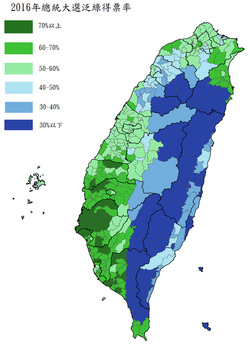 Taiwan 2016 presidential election results by township: not a blue north anymore. Taiwan 2016 presidential election results by township: not a blue north anymore. The North Is No Longer Blue Tsai's wins in the north are also surprising because the conventional wisdom has long held that Taiwan has a strong regional divide, with a deep blue north, deep green south, and swing districts in the middle. This is obviously a simplification, but it's so widely accepted among the political commentariat in Taiwan that there's even a wikipedia entry in Chinese for the phrase, "blue north, green south" (beilan, nanlü 北藍南綠). The accepted explanation for these regional political differences is that they reflect socioeconomic and sub-ethnic ones: there are more waishengren in the north and east, aborigines in the east and central highlands, and a concentration of Hakka voters in Miaoli and Hsinchu Counties who have tended to support pan-blue candidates, while the Hoklo benshengren heartland of Tainan has been the DPP's strongest area. But some research has found region to be a significant independent predictor of vote choice even accounting for partisanship, national identity, age, occupation, attitudes toward cross-Strait relations, and so forth. Why would this be? Part is probably a "local hero" effect--national candidates do better than average in their hometowns because of their long-standing personal connections there that trump partisan affinities. Part is certainly a factional story: when local factions switch sides they can bring a big chunk of votes with them all the way up to the presidential level. But while these effects certainly have existed in local and legislative elections for a long time, it's not obvious that they consistently matter in presidential ones. Does Political Geography Still Matter in Taiwan? The way that Tsai won in 2016 leads me to think we should reconsider how, or even whether, geography has an independent effect in presidential elections. It's not self-evident that presidential vote choice in 2016 had anything to do with where voters lived, once we take into account all the usual demographic variables. There was no pan-blue firewall north of the Choshui River, and the DPP's win was clearly not built on turning out more core supporters in pan-green strongholds in the south. Instead, the swing data suggest a shift in the same groups of voters toward Tsai and away from the KMT all over the island. (Voting for the legislature is a different matter--I'll tackle that in a separate post.) Granted, the swing toward Tsai was not as uniform as in 2012, when it ranged between only 2.58 and 4.88%. But still, in every single locality Tsai won at least 5% more in 2016 than she did four years ago. That suggests, for at least the last two elections, voters who switched their votes to Tsai did so because of factors not correlated with where they lived. The best illustration of the irrelevance of geography to vote choice is what happened in New Taipei, where Eric Chu was, and still is, the mayor. He was re-elected there in 2014, holding on during a green wave that flipped most of the other local executives to the DPP. If a candidate's local connections matter at all, then Chu probably should have been able to deliver a hometown bump. Yet a little over a year later he won only 1/3 of the vote in New Taipei, winning 250,000 votes less than he did in the mayor's race, a lower share than the 37.5% he got in Taipei City proper and only 2 points above his island-wide total. And as the figures above show, Tsai Ing-wen improved more in New Taipei than she did nationally--not the result we'd expect if Chu was enjoying some kind of home-court advantage. 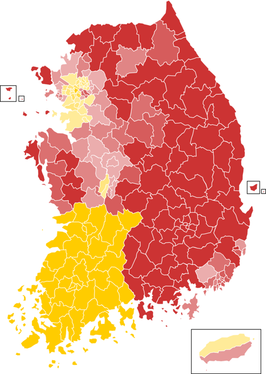 Regional voting patterns in South Korea: Jeolla in the southwest, Gyeongnam in the southeast. Regional voting patterns in South Korea: Jeolla in the southwest, Gyeongnam in the southeast. Now THIS is What a Party Stronghold Looks Like Finally, consider the comparative angle. There's a country not far away that demonstrates exceptionally strong regional effects on voting behavior: South Korea. In the last presidential election there (in 2012), the opposition candidate Moon Jae-in won at least 85% of the vote in the three provinces that make up the southwest region of Jeolla, while the incumbent party candidate Park Geun-hye won over 80% in two provinces in the southeast region of Gyeongsang. That is a stark regional divide that has been present since the beginning of the democratic era in Korea. By this standard, Taiwan doesn't look very divided by geography at all. Does Where You Live Affect Who You Support for President? In fact, it's worth considering whether the "blue north, green south" trope has outlived its usefulness as a guide to voting behavior in Taiwan. The Taiwanese media often writes election narratives that emphasize geography as the key to understanding voting patterns in presidential elections, with frequent discussion of "battleground regions" and "swing districts." And political scientists, too, routinely use the language of electoral geography to talk about presidential campaigns. (I'm guilty of this too. For other instances, see here, here, and for a kick, this wikileaks cable from AIT.) But if you think about this a bit, it's an odd way to characterize voting for a single national office. Taiwan doesn't have an electoral college, so an extra vote for Tsai in Penghu is worth the same as one in Taipei, or Taichung, or Hualien, or anywhere else in Taiwan. When we talk about "swing regions" we are implicitly underemphasizing factors that don't vary much by location and playing up ones that do, like factional ties. And I'm starting to think those other, non-geographic factors are where the real story is at, particularly differences between age cohorts. Something to keep in mind as we pour over the post-election survey data. 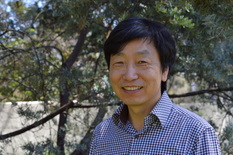 The Taiwan Democracy Project will hold its next seminar of the fall on November 11. The speaker is Jong-sung You, a senior lecturer in the Department of Political and Social Change at Australian National University, and he'll be speaking about electoral campaign regulation in South Korea and Taiwan. The event is free and open to the public; you can register at the event page. The talk is entitled: "Liberal Taiwan versus Illiberal South Korea: The Divergent Paths of Electoral Campaign Regulation." Details are below. Abstract Both South Korea and Taiwan are considered consolidated democracies, but the two countries have developed very different sets of electoral campaign regulations. While both countries had highly restrictive election laws during their authoritarian eras, they have diverged after democratic transition. South Korea still restricts campaigning activities, including banning door-to-door canvassing, prohibiting pre-official period campaigning, and restricting the quantity and content of literature. Taiwan has removed most campaigning restrictions, except for finance regulations. This study explores the causes of these divergent trajectories through comparative historical process tracing, using both archival and secondary sources. The preliminary findings suggest that the incumbency advantage and the containment of the leftist or opposition parties were the primary causes of regulation under the soft and hard authoritarian regimes of South Korea and Taiwan. The key difference was that the main opposition party as well as the ruling party in South Korea enjoyed the incumbency advantage but that opposition forces in Taiwan did not. As a result, the opposition in Taiwan fought for liberalization of campaign regulations, but that in South Korea did not. Democratization in Taiwan was accompanied by successive liberalizations in campaign regulation, but in South Korea the incumbent legislators affiliated with the ruling and opposition parties were both interested in limiting campaigning opportunities for electoral challengers. Bio
Dr. Jong-sung You is a senior lecturer in the Department of Political and Social Change, Australian National University. His research interests include comparative politics and the political economy of inequality, corruption, social trust, and freedom of expression. He conducts both cross-national quantitative studies and qualitative case studies, focusing on Korea and East Asia. He recently published a book entitled Democracy, Inequality and Corruption: Korea, Taiwan and the Philippines Compared with Cambridge University Press. His publications have appeared at American Sociological Review, Political Psychology, Journal of East Asian Studies, Journal of Contemporary Asia, Asian Perspective, Trends and Prospects, and Korean Journal of International Studies. He obtained his Ph.D. in Public Policy from Harvard University and taught at UC San Diego. Before pursuing an academic career, he fought for democracy and social justice in South Korea. |
About MeI am a political scientist with research interests in democratization, elections and election management, parties and party system development, one-party dominance, and the links between domestic politics and external security issues. My regional expertise is in East Asia, with special focus on Taiwan. Archives
January 2024
Categories
All
|
||||||
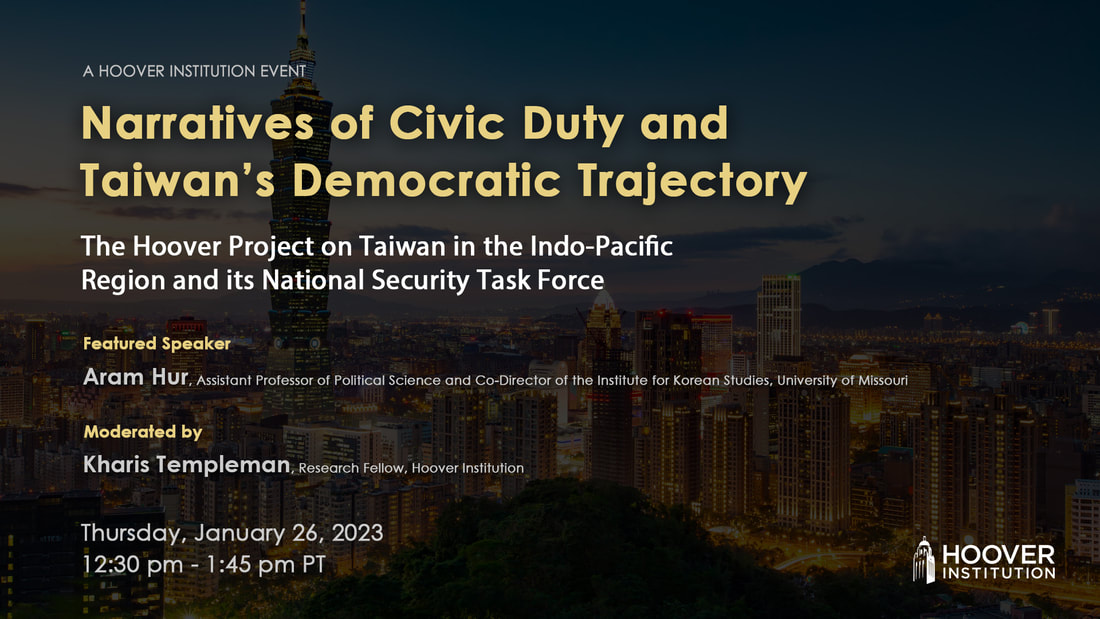
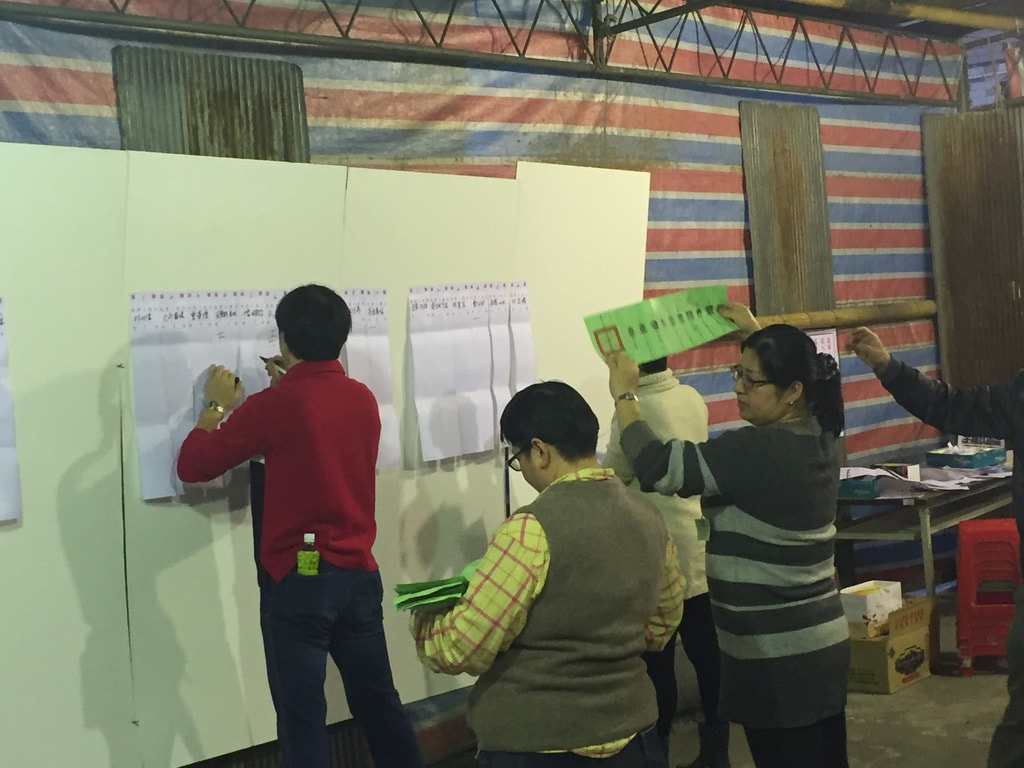
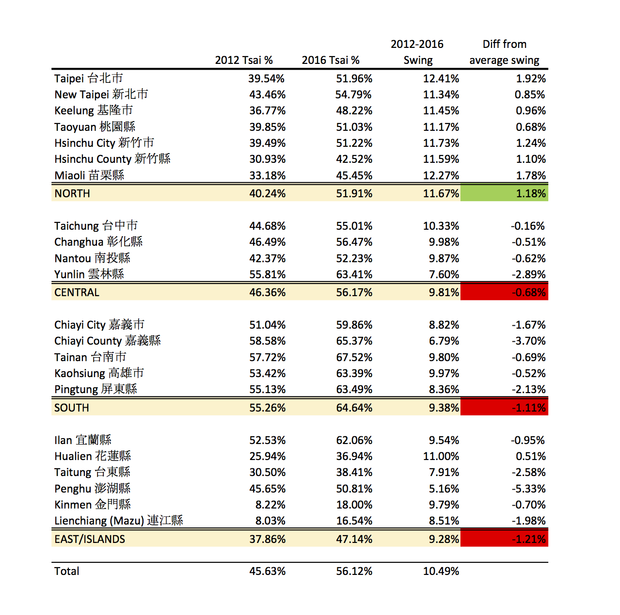
 RSS Feed
RSS Feed
